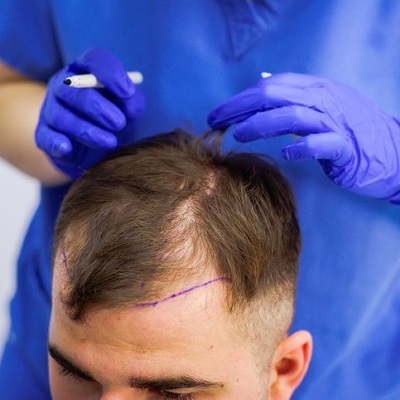
Hair transplant procedure is now a standard and effective treatment for baldness in Islamabad where advanced clinics and experienced professionals are readily available. Although hair transplants are usually safe and successful, sometimes complications can occur just like with any other medical procedure. So if you are wondering How Do Doctors in Islamabad Handle Complications in Hair Transplant Procedures then read this blog to know the details of how we at Royal Hair Transplant handle complications that can happen during hair restoration treatment.
What is Hair Transplant?
A hair transplant moves hair follicles from a donor area (usually the back of the scalp) to balding areas. The two main techniques of it are:
- Follicular unit extraction
- Follicular unit transplantation
How Do Doctors in Islamabad Handle Complications in Hair Transplant Surgeries
1. Pre-Hair Transplant Evaluation to Prevent Complications
The foundation of a safe and successful hair transplant lies in a proper preoperative evaluation. Doctors in Islamabad take this step seriously to minimize the complications before they even happen. On the first consultation, physicians usually:
- Obtain a comprehensive medical history
- Conduct a scalp analysis to look for skin conditions
- Request blood workups to eliminate infection, anemia, or bleeding disorders
By recognizing risk factors early physicians may postpone or modify the treatment for safer results.
2. Islamabad Doctors’ Use of Advanced Hair Transplant Methods
Top hair transplant centers in Islamabad employ advanced methods such as Follicular Unit Extraction (FUE) and Direct Hair Implantation (DHI). These procedures are renowned for:
- Less scarring
- Quicker recovery
- Less risk of complications
3. Handling Common Hair Transplant Complications in Islamabad
Even with optimum preparation, slight complications do happen. Here is how leading physicians in Islamabad treat them gently and professionally:
3.1 How Islamabad Clinics Treat Hair Transplant Infections
Infection is unusual but can occur if post-op hygiene is neglected. Clinics rigidly stick to sterilization measures, and if an infection happens:
- Immediately, antibiotics are given
- Area cleaning and tight surveillance
- Drainage could be done if abscesses are formed
3.2 Managing Excessive Bleeding Following a Hair Transplant
There is normal blood loss, but it is excessive bleeding that is treated by:
- Application of pressure
- Employment of hemostatic agents
- Suturing in exceptional situations
Physicians also instruct individuals to stop using blood thinners, alcohol, or smoking before operation, since these enhance the risk of bleeding.
3.3 Swelling Following Hair Transplant Surgery: Causes and Remedies
Forehead or eye swelling is usual within days of operation. Islamabad physicians recommend:
- Cold compresses
- Anti-inflammatory drugs
- Resting with the head elevated
3.4 Knowing Shock Loss Following a Hair Transplant in Islamabad
Shock loss is hair shedding, usually in the weeks following a transplant. It is a normal phenomenon and usually corrects itself. Physicians reassure recipients and might suggest:
- PRP (Platelet-Rich Plasma) therapy to induce regrowth
- Nutritional supplements and support
- Follow-ups now and then to check progress
3.5 Repairing Poor Hair Graft Survival and Irregular Growth
Occasionally, not all grafts survive, or hair grows irregularly. Islamabad’s skilled surgeons deal with this by:
- Re-assessing the affected part
- Providing touch-up sessions after 6–12 months
- Suggesting growth-enhancing treatments
4. Islamabad Clinics’ Post-Operative Hair Transplant Care
Good aftercare is essential in preventing complications. Leading Islamabad clinics offer individualized post-op care consisting of:
- Scalp washing and drying instructions
- Limited activity for a few days
- Antibiotic creams or sprays
- Regular follow-ups, usually weekly for the first month
5. Patient Education and Transparency in Hair Restoration
Part of complication management is establishing realistic expectations and making patients aware. Physicians in Islamabad focus on:
- Talking about possible outcomes before surgery
- Sending detailed post-op instructions
- Being honest about realistic outcomes so that patients understand what to expect
Conclusion: Why Islamabad is a Trusted Hub for Hair Transplant Surgery
Hair transplant side effects, though infrequent, are well-handled when you are in the care of experts. If you are considering hair transplant and want to know How Do Doctors in Islamabad Handle Complications in Hair Transplant Surgeries then call us now and book your consultation with our practitioner Hair Transplant surgeon Dr. Shahnaz Muazzam at our clinic Royal Hair Transplant in Islamabad. She will evaluate your history and current situation and will customize the treatment plan for maximum effectivity and best results without any complications.



Leave Your Comment